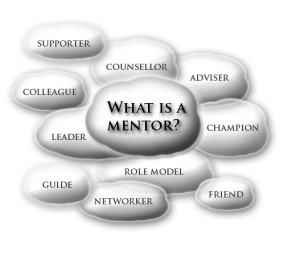 The business world has long recognized the importance of mentoring. Education has been slower to embrace the concept, although many states have it in place for teachers who don’t enter the profession through the traditional route and have student teaching experience. On the whole, this option is not available to librarians and yet those new to the profession need this support far more than teachers.
The business world has long recognized the importance of mentoring. Education has been slower to embrace the concept, although many states have it in place for teachers who don’t enter the profession through the traditional route and have student teaching experience. On the whole, this option is not available to librarians and yet those new to the profession need this support far more than teachers.
Most school librarians work alone. Teachers and administrators assume you learned everything you need to know to do your job at library school, but this is far  from the reality. Managing the environment without having the structure of a classroom is a challenge in itself. Getting to the “backroom” responsibilities and doing clerical tasks or overseeing a clerk or volunteers (increasingly rare) handling them while still focusing on teaching and meeting student and teacher needs require focus and organizational skills you were not likely to have been taught. Generally, school librarians are thrown into the deep end and have to learn to swim.
from the reality. Managing the environment without having the structure of a classroom is a challenge in itself. Getting to the “backroom” responsibilities and doing clerical tasks or overseeing a clerk or volunteers (increasingly rare) handling them while still focusing on teaching and meeting student and teacher needs require focus and organizational skills you were not likely to have been taught. Generally, school librarians are thrown into the deep end and have to learn to swim.
In 2007, my colleague Ruth Toor (now retired) and I wrote New on the Job (ALA Editions) to deal with the challenge. I am now working on the second edition. Ironically, it has become a text book in a number of library school courses. Although I believe it is a solid resource for beginning librarians, it does not replace the benefits of a mentor.
 My state association, New Jersey Association of School Librarians, works with our Department of Education to provide mentoring for new librarians. A handbook (unfortunately in need of updating) guides mentor and mentee through the requirements and responsibilities of the relationship. Over the years it has been in place, I have taken the opportunity to mentor a number of librarians, giving back to the profession I love.
My state association, New Jersey Association of School Librarians, works with our Department of Education to provide mentoring for new librarians. A handbook (unfortunately in need of updating) guides mentor and mentee through the requirements and responsibilities of the relationship. Over the years it has been in place, I have taken the opportunity to mentor a number of librarians, giving back to the profession I love.
If you have been a librarian for over five years, consider offering to mentor a newbie. For those entering the profession, I strongly recommend you seek out a mentor. Look for someone who is active at the state and/or national level. Don’t be afraid to approach people you think are “famous.” They are usually more than happy to help.
Your mentor will guide you through the pitfalls of dealing with teachers, administrators, and board members who wander into your library. They can help you with classroom management and creating a budget. When you need to vent, your mentor is a safe person to whom you can turn.
We cannot afford to have any librarian fail. It puts their jobs, their programs, and the students and teachers they serve at risk. Ask for help – or be the one to provide it.
